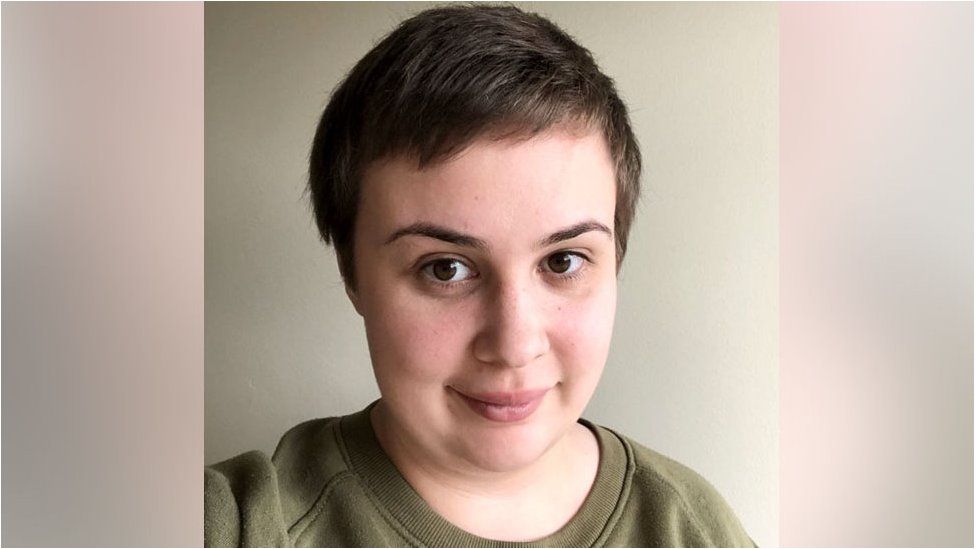Attitudes towards disability: 'Teenagers threatened to tip me out of my wheelchair'
- Published

From tipping people out of their wheelchairs to patronising comments and taking unwanted snaps, the reality of everyday behaviour towards disabled people is revealed in Scope's largest attitude survey.
Naomi Baker had just bought a coffee in Eastbourne town centre and was waiting for a friend when a group of teenagers approached.
"They surrounded me in my wheelchair and started screaming at me," she recounts. "There were threats to tip me out of my wheelchair."
Naomi, 24, chose not to talk to or look at the group in the hope they would leave her alone.
"There was a level of panic. I thought: 'Are they actually about to tip me out?'
"Because if they try to do that, there is nothing I can do to stop them."
A passer-by intervened and the teenagers moved on, but the experience stayed with Naomi.
She is not alone. Disability charity Scope has revealed to BBC Access All that three out of four disabled people it surveyed had experienced negative attitudes and behaviour towards them in the last five years.
Listen to Access All on BBC Sounds
In the latest Access All podcast, Naomi Baker and Shani Dhanda talk more about the negative things people say and do to them and how it affects their self esteem.
And with record temperatures bearing down on London, wheelchair-user Adam Gabsi talks about the frustration of being stuck in his sixth-floor flat for 12 days due to broken lifts.
Scope's research involved more than 4,000 disabled people talking about the negative attitudes they had experienced from strangers or family. That includes behaviour from judgement on their perceived ability to being patronised or discriminated against.
Like Naomi, one in 25, or 4%, also reported physical abuse against them while 25% of those surveyed said they had been accused of faking their disability.
Naomi believes that might have been a factor in her encounter.
"There was kind of an implication I was faking it," she says. "They were almost keen to see, if they tipped the wheelchair would I be able to get up by myself?"
Scope's research found that younger people experienced the greatest amount of abuse with one in two disabled people having experienced negative attitudes and behaviours towards them in the past 12 months.
Of those aged 18-34, 22% had experienced verbal abuse, compared to 10% of those aged 55 or older in the past five years.
Shani Dhanda, a disability activist, isn't surprised that younger people are getting more negative behaviour.
She has osteogenesis imperfecta, better known as brittle bones, is short of stature and uses a wheelchair.
"I've had lots of different negative experiences out in public with strangers," she says.
It started when she was 16 and began going out on her own "and I'm really sad to say that it hasn't stopped". She is now 35.
Shani has experienced everything from people asking whether she really is disabled to accusing her of wrongfully using disabled parking bays.
But the biggest discrimination she faces is being photographed without consent.
"A lot of people take pictures and videos of me for Snapchat - not in a nice way," she laughs, saying it is because she's small and looks different.
Shani believes younger people face poorer attitudes and behaviour towards them because people have a "certain level of expectation" of young people, without looking beyond their age.
"When disabled people share their needs, they're not being believed - [they think] you're young and fit, but that may not be the case," she says.
And these comments have a tangible impact.
Almost a third of young disabled people who took part in the survey reported that they avoid socialising following a negative experience, compared to 14% of those aged over 55.
And 41% said these careless assumptions both reduced their confidence and self-belief and left 44% feeling that they were less equal to non-disabled people.
Naomi says, beyond the physical attack, she experiences a "constant drip, drip of microaggressions" whenever she's out, from people manhandling her wheelchair to being "treated like a child".
"I laugh a lot of them off," she says. Then admits: "It makes me much more anxious about going out."
Scope's survey gathered incidents from the past five years so that it included the affects of the pandemic.
While many of us might remember communities rallying together, some of the testimony received in the survey points to far more distressing moments.
One respondent revealed they were "spat at, pushed and abused" and "blamed" for the lockdown because of their disability. Lockdown was often talked about in terms of protecting those at risk, like disabled or chronically ill people.
Shani also says she noticed the number of incidents she faced worsen during lockdown which left her feeling "vulnerable".
Scope said its research confirmed that "disabled people still face huge barriers to full inclusion and equality in society".
It added: "The pandemic's brought to light the huge divide that we have and the huge lack of care for disabled people that exists within society."
Over the next five years it hopes to tackle this stigma by sharing its research with disability and campaign groups to "find common ground" and to "collectively put an end to negative attitudes".
In the short term, Shani has found her own way of gaining ownership over unwanted incidents.
When she clocks someone filming her without permission she now approaches them and asks them what they are doing. If they deny filming her she asks them to show her the last image in their camera roll
"And you know what, nobody ever does," she says, hoping that in some way it might be the start of them reflecting on their behaviour.
You can listen to the podcast and find information and support on the Access All page.